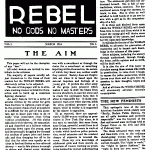Humanism developed in late Medieval Christianity, but moved on. European humanism reached high points in the Reformation and the Enlightenment and in Post-Second World War Europe and many of its colonies, including the US. But moved on.
Humanism is not a philosophy. It is a way of thinking. This naturalistic way of thinking values observation and reason, seeks to promote human liberation and justice, and works to benefit the planet and its living things.
As a way of thinking, humanism goes well beyond a reaction against Christian oppression or European thought. It includes many Earth Centered traditions, Taoism,
Confucianism, some schools of Hinduism, and Ubuntu in Africa.
While it is unquestionably true that the idea of humanism lies in an assertion of subjectivity and individuality in the human mind—thinking and doing encompassed by what we call the humanities—naturalism—science—shows us that the individual consciousness is fallible and deeply flawed. Far from an over-confidence in the human mind, the humanist way of thinking works in community and extreme humility, accepting the human propensity toward illusion as inevitable.
We don’t know much and we aren’t capable of knowing very much. We are adapted creatures emerging from complex systems.
As a way of thinking, humanism re-opens the file, the book, the story. Humanism says, Look again—rethink this. Try something else. In humanist thinking, the scriptures and traditions of the world’s religions and governments are products of human thinking, and therefore subjective and culture-bound. They are idols made by human hands. But so is last year’s truism and the popular, accepted thinking of our own time.
For me as a young person, the old Anarchist slogan “no gods, no masters!” rang like a freedom bell. The slogan fired my imagination, and I became a humanist; I have dedicated myself to human liberation since, in my own small way. We humanists each do our part as best we can.
Humanism is about liberation. Liberation of humanity. Liberation of the planet and its living things. Liberation from European, colonialist thinking. Liberation from oppressive systems of thought and oppressive social restraints.
Humanism is about living a shared life and achieving a shared world. Since humanists do not believe that the gods have rewarded one nation or one group of people with the right or privilege of taking more than its portion of our shared world, we strive for redistributive justice.
We strive for human liberation—equal dignity, equal distribution, human—not corporate—priorities. Our commitments are love, doubt, reason, justice.
For me, “go gods, no masters” sums that up. Other humanists have other ways of expressing humanism, not as a belief system, but as a way of thinking and action.
See: https://en.wikipedia.org/wiki/No_gods,_no_masters
















